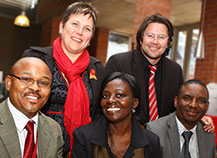Latest News Archive
Please select Category, Year, and then Month to display items
12 January 2024
|
Story Nonsindiswe Qwabe
|
Photo Sonia Small
 Since joining the UFS in 2008, Dr Grey Magaiza has worked extensively on approaches that can foster the socio-economic transformation of societies.
Since joining the UFS in 2008, Dr Grey Magaiza has worked extensively on approaches that can foster the socio-economic transformation of societies.
“The future should be one where communities can decide on their development agenda and futures. That’s the most important for me.” Dr Grey Magaiza, Deputy Director of the Centre for Gender and Africa Studies (CGAS) and Head of the Community Development programme on the Qwaqwa Campus, is passionate about capacitating communities to be agents of change and advancement. His vision for the future emphasises the empowerment of communities to take charge of their development by actively participating in decision making and the implementation of development projects that can improve their lives.
Since joining the UFS in 2008, Dr Magaiza has worked extensively on approaches that can foster the socio-economic transformation of societies. Over the years, he has crafted his research speciality into one that he is most proud of – being an interdisciplinary scientist immersed in the development of communities.
“I’m in a fortunate position of researching what I like. I say ‘fortunate’, because I’ve taken the time to understand what I’m passionate about, which is the overall field of rural livelihoods and livelihood futures – in short, community development. My research starts from an engaged university, understanding the elements that a university must use to enhance transformation and relevance to its immediate community in terms of development.”
One of the ways he has done this is by looking at social entrepreneurship as a development approach for young people in a rural setting. Through workshops with non-profit and civic organisations in Qwaqwa, Dr Magaiza has been helping these organisations to map out their needs and actively meet them through the involvement and support of external role players.
“We understand that communities are part of the national development agenda, but even that national agenda respects community knowledge and intentions and allows communities to shape their identity. A critical enabler of this is community organising. You bring back the capacity in communities to have dialogues on issues affecting them as spaces for engagement, knowledge exchange, and for people to just talk about their way forward.”
By enabling communities to define their development agenda, they can address their specific needs, challenges, and aspirations, he said. “When I look at livelihood futures, it’s quite an exciting aspect of my work – it’s like looking into a fortune tellers’ globe, because you’re not deciding for communities what they should do, but the communities themselves take those decisions.”
Unit for Students with Disabilities impresses
2012-08-10
 |
MUT learns from UFS: From the left, back: Ms Hetsie Veitch, Head of the Unit for Students with Disabilities at the UFS; Mr Rudi Buys, Student Dean at the UFS; front: Mr Mthoko Ntuli, Student Development Officer; Ms Lindiwe Chamane, Student Guidance Officer; and Dr Sibongiseni Ngcamu, Coordinator of Organisational Development (all from the MUT).
10 August 2012 |
Staff of the Mangosuthu University of Technology (MUT) in KwaZulu-Natal visited the Bloemfontein Campus of the University of the Free State (UFS) to gain insight into the working of the Unit for Students with Disabilities. They visited the campus on recommendation of the Deputy Minister of Women, Children and People with Disabilities, Ms Hendrietta Ipeleng Bogopane-Zulu.
In the interaction between the two institutions, it was agreed that the Unit for Students with Disabilities would assist the MUT in drawing up a policy for students with disabilities, as well as on how to make residences more accessible and to manage support services for the students. The two institutions also agree to closer collaboration of student governance and leadership development as well as international students.
Ms Hetsie Veitch, Head of the Unit for Students with Disabilities, said this was not the first time that the UFS was used as a benchmark. She said the UFS is held in high regard because every disabled student’s needs were specifically addressed. “We follow a holistic approach so that students with disabilities have the same student life and experience as any other